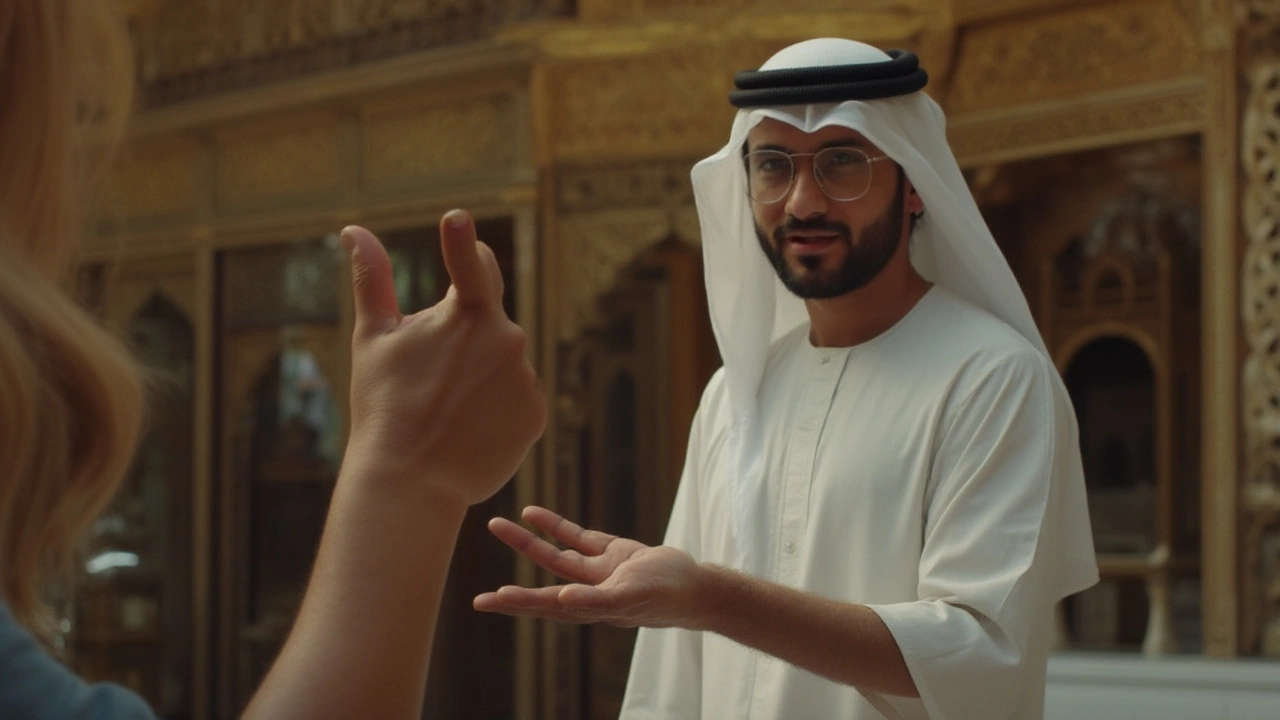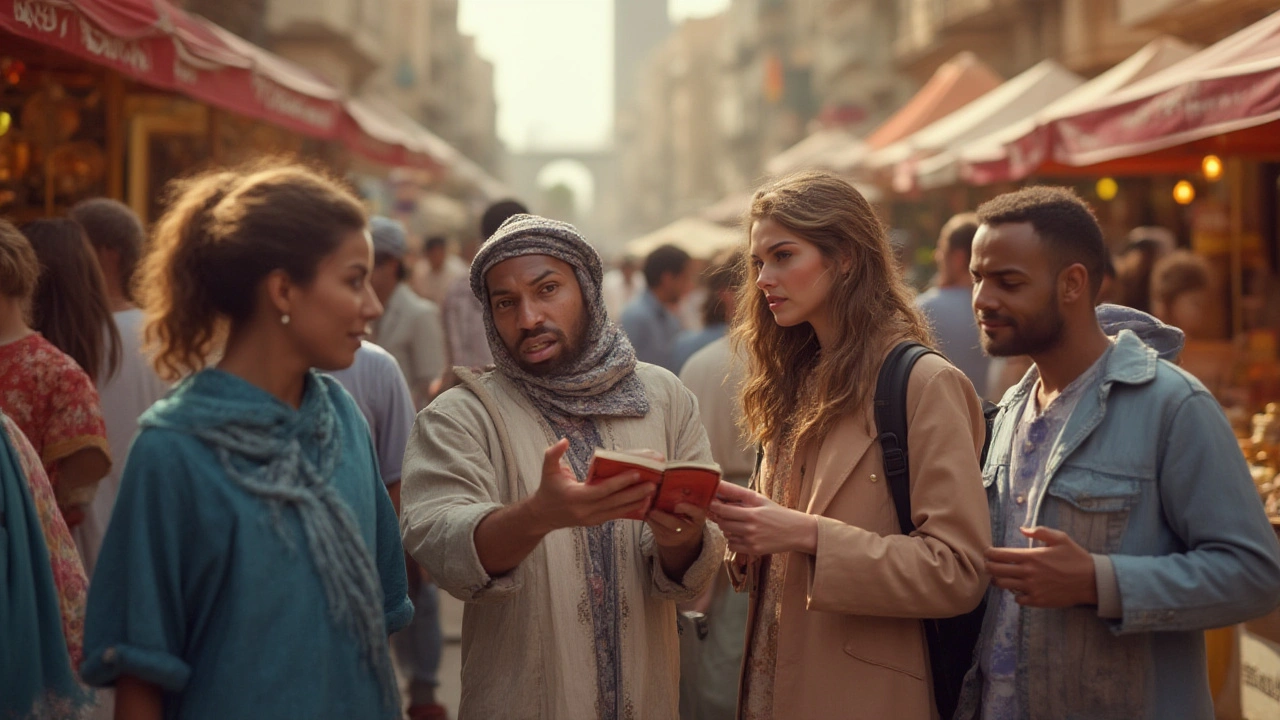Picture yourself landing in the bright, bustling heart of Dubai. It’s your first day in the city, palm trees rushing past outside the window, the skyline glittering in the heat. You’re feeling excited, ready to dive in. Maybe you’re meeting a driver or asking a local for directions. You want to show everything’s perfect—so you flash a cheerful thumbs up. Stop right there. That tiny thumb could just have said something you didn’t intend. In Australia, the thumbs up means simple approval, or, honestly, 'no worries, mate.' But in Dubai? That gesture sits on a completely different track.
What Does a Thumbs Up Mean in Dubai?
In Dubai, the thumbs up seems innocent enough. A lot of tourists just use it automatically, without thinking twice. In fact, you’ll see it everywhere online, on memes and emojis. But here’s where things twist. In the UAE and across much of the Middle East, the thumbs up can carry a much ruder meaning—close to flipping someone the bird, or showing outright disrespect. It’s no joke: researchers from the University of Sharjah have found that nearly a quarter of Emiratis think the thumbs up is an offensive sign, especially from strangers or in formal settings.
The risk is higher in rural areas or among older people. Younger generations, especially in Dubai’s international circles, are less likely to take offense. They probably scroll past dozens of thumbs up emojis every day, thanks to how global pop culture mixes traditions here. But scratch the surface, and you’ll find that these old interpretations haven’t vanished. A 2023 poll from a Gulf-based etiquette site reported that 18% of people in the UAE had been bothered by Western hand signals, and the thumbs up made the top three.
It’s not just about being polite. Dubai is a cosmopolitan city—85% of its population are expats from every part of the world. That mix means rules get blurry, but it also means the stakes are high. A simple hand gesture could annoy a boss, embarrass you at dinner, or cause a misunderstanding with someone important. Imagine giving a thumbs up at the wrong time to an immigration officer or a new colleague. Most of the time, people will let it slide. Every now and then, though, you might get an awkward stare, or a comment that makes your heart sink. Want to play it safe? Skip the thumbs up for anything formal, professional, or when you’re not sure how your gesture might be taken.
The Origins of the Thumbs Up—and Why It’s Tricky
Why does a universal good-vibes sign turn sour in the Middle East? The answer comes down to history—and a bit of psychology. In the West, the thumbs up goes back to Roman times, with legends saying gladiators’ lives depended on the crowd’s thumb. But in the Middle East, the gesture took a nasty twist many generations ago. It’s been linked with rude, dismissive gestures, sometimes compared to giving the middle finger in Western culture.
Anthropologists say the difference comes from how societies interpret the position of the hand. In some cultures, an upright thumb signifies approval, in others, it feels like a taunt or insult. Traditions in Iraq and Iran have also seen the thumbs up as a vulgar gesture for centuries. That symbolism has spilled over the border to neighbours like the UAE, even as modern Dubai has shifted towards global norms. You’ll even see stories online about contractors being thrown out of meetings, or tourists being told off by hotel staff for an unthinking thumbs up.
The UAE, and especially Dubai, is a place that asks for respect. It’s not about being rigid or old-fashioned. It’s about showing awareness of culture, the same way you’d dress differently for a religious site or speak quietly in a place of worship. When in doubt, just smile, or say “thank you” out loud, and keep your hands low. It’s a tiny adjustment—and it helps you dodge those awkward moments that can stick in your memory longer than any jetlag.

What Gestures Should You Avoid in Dubai?
The thumbs up isn’t the only sign that can throw you into hot water in Dubai. The city might feel glitzy and modern, but it’s shaped by deep-rooted traditions. You’ll want to watch your hands—in every sense. Here’s a quick run-through of the main gestures that spell trouble:
- Thumbs Up: As we’ve covered, can be considered rude, especially to elders or strangers.
- Pointing Your Finger: Used to call someone over or scold, which is seen as disrespectful. Instead, use your whole hand, palm facing down.
- Showing the Sole of Your Foot or Shoe: Feet are considered unclean, so crossing your legs with the sole showing, or placing your foot up, is a faux pas.
- Left Hand Use: Traditionally, the left hand is reserved for hygiene. Eat, shake hands, or give gifts with your right hand.
- OK Sign (Thumb and Index Finger Forming an ‘O’): For some, this is rude, especially among older Arab and Mediterranean people. Best avoided in formal situations.
- Finger Snap or Flick: Used to get someone’s attention, which is seen as demeaning.
- Beckoning with One Finger: Like for a pet, not a person—so it’s a solid no.
It’s easy to trip up. Even if you mean well, these social rules can catch you off guard. Respect goes a long way. If you’re in doubt, just mirror what those around you are doing—or keep your hands relaxed at your sides.
Tips for Non-Verbal Etiquette in Dubai
You don’t need to be tense and robotic every time you move your hands. But you do want to be more deliberate, especially in business and formal settings. Start with these basics:
- Smile. It breaks the ice and travels well across cultures.
- Use your right hand for eating, greeting, or handling gifts. This is a firm cultural expectation in the UAE.
- Handshakes are normal but wait for the other person to offer—especially between men and women. Some Emiratis are conservative about physical contact.
- If uncertain about a gesture, avoid it rather than risk sending the wrong signal.
- Observe body language. People tend to stand a bit closer when talking in the UAE, but touch is less common than you’d find in Europe.
- Speak up if you’re confused. Most locals are patient with respectful questions and appreciate when you try to understand their world.
- Avoid snapping your fingers or clapping your hands for attention—instead, use "excuse me" or approach politely.
When you’re out with friends or coworkers, you’ll see a relaxed side of Dubai, but in a business meeting, courtroom, or government office, formality will be front and centre. Save high-fives and thumbs up for people you know very, very well. In public, play it cool—not everyone will call you out, but you never know who’s watching.
Here’s a quick cheat sheet to help you remember which hand gestures are cool and which are not in the UAE:
| Gesture | Meaning in UAE | Safe to Use? |
|---|---|---|
| Thumbs Up | Offensive / Rude to some | No (use with caution) |
| Right Hand Only | Respectful, proper | Yes |
| Pointing Index Finger | Rude, commanding | No |
| OK Sign (O with thumb & index) | Poor taste / Rude | No |
| Showing Sole of Foot | Unclean / Disrespectful | No |
| Hand Over Heart | Sincere, respectful | Yes |
| Left Hand Only | Unhygienic / Rude | No (unless unavoidable) |

When It’s Okay (Or Not) To Use Thumbs Up in Dubai
You might see Emiratis or expats exchanging the thumbs up on occasion. Not everyone reacts the same way to this gesture. Here’s when the thumbs up won’t get you into trouble:
- Among close friends who are familiar with Western culture.
- In international spaces like expat bars, hotels, or with non-local colleagues who use the gesture freely.
But the list where you shouldn’t use it is longer—and more crucial. Don’t use the thumbs up in:
- Formal meetings (business or government).
- Talking with elders or anyone you meet for the first time.
- Public offices—airport, immigration, police, hospitals.
- Traditional family settings, especially during religious or community gatherings.
Even Dubai’s glossy, global side can’t erase deep cultural norms. It’s all about reading the room—something travelers and expats become pros at over time. It isn’t about being nervous or freezing every time you want to communicate—after a few weeks here, you get the hang of which gestures float and which ones sink.
You’ll see people using emojis—the thumbs up in Dubai doesn’t carry the same risk when it’s online. Face-to-face, play it safe.
Now, you may be wondering, "Can someone really get in legal trouble for a thumbs up?" The answer: probably not unless you've also done something else rude or caused a scene. Dubai police handle thousands of tourists daily and aren't looking to ruin anyone’s holiday for a hand sign. But, there have been cases where a thumbs up, combined with an argument, made things escalate. If you ever get called up on a gesture, just apologize—no ego, no drama. People here value humility over sticking to your guns.
One final tip: If you’re traveling across the UAE (outside Dubai), the rules get stricter, especially in Sharjah and more traditional emirates. The same goes for rural areas or when dealing with people who might not be comfortable with Western-style humour or informality. The key is always respect for the customs of the place you’re visiting.
